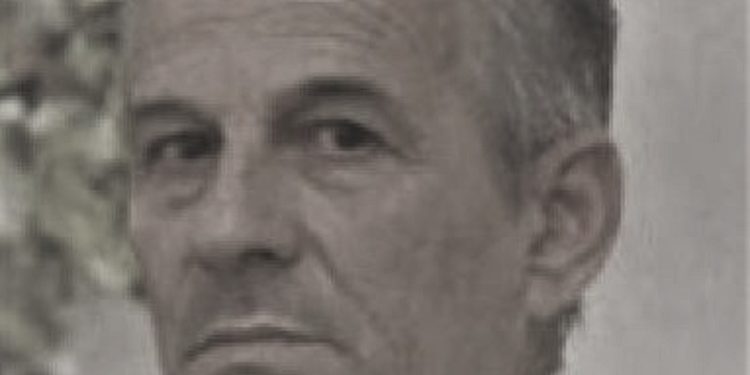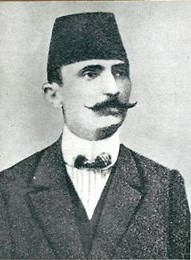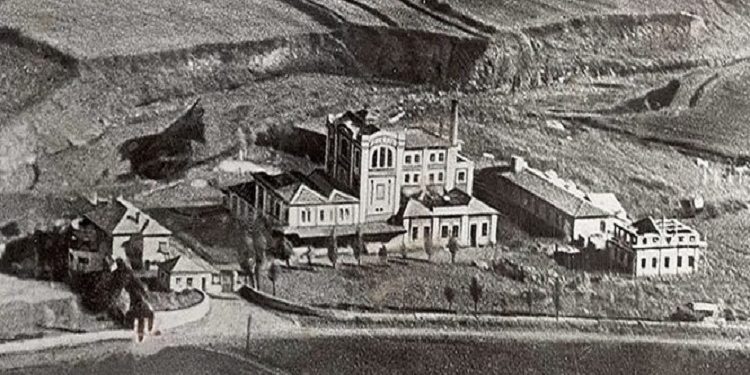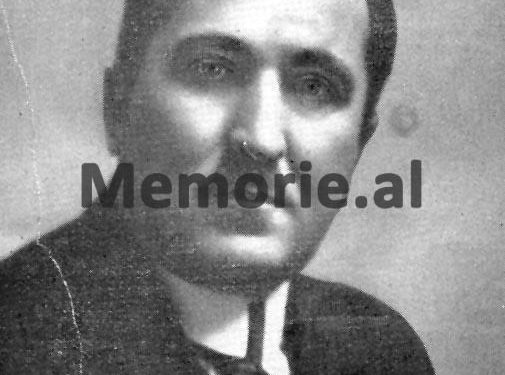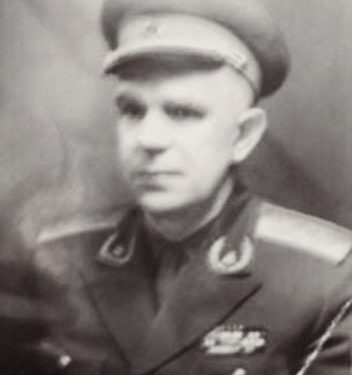From Vepror Hasani
Second part
-The saga of the well-known patriotic and richest family of Korça, where its children graduated from European universities-
Memorie.al / That evening, Selim Mborja (Venxha) and his wife, Fitreten, returned home late. In Korça they had 65 shops, cafes and apartments, thousands of hectares of land and forests. Initially, they had lived in the house in the village of Mborje, next to the church of Ristozi, in a large two-story building, with a magnificent view, built with carved stones, with many rooms decorated with carved wooden elements and decorated ceilings, with large yard in the frontal view of, woven with dooryard. Around this house, the other houses of the Mborja (Venxha) tribe were built. Then they built another big and beautiful house above the Birra Korça factory. They already lived there.
Continues from the previous issue
His wealth was valued by all the banks: “The agent of the Viennese Bank found out when he was in Thessaloniki, that a person from the city of Korça owned a significant amount of gold coins. His name was Selim Mborja. He came to meet him at his house.
Selimi welcomed the agent’s proposal, to deposit the gold coins in that bank, but with one condition, that the interest percentage would be paid by calculating not the amount of coins, but their weight in kilograms. The realtor, surprised by this unheard request until then in any country in the world, informed the Bank of Vienna, saying that; this bey korçar, he didn’t have money in fistfuls, but in tin cans.
The bank convened the council, to decide. The next day, the Viennese newspapers gave the sensational news: “An Albanian rich man forces the Bank of Vienna to make an addition to its regulation”! (Vangjush Ziko, “Korça, memories and the city”).
This was also the reason why Selim Mborja, during all the time he stayed in Korça, was either a member or chairman of all the established societies, because everyone knew that he did not spare himself financially; he never lacked the support of his wife; she was a grieving soul.
The name of Selim Mborje is found in the “Vatra e Albania” federation, based in Korça, in the “Red Cross”, in the “Sport Klub Korça”, in the commission for the collection of aid for the establishment of the Lyceum of Korça, after the fund of 50,000 francs from the state budget, was insufficient, to the “Cinematro Society”, to the “Economic Chamber”, to the “Korça Tennis Club”, to the “Këneta e Maliqi” society, etc., etc. In 1921-’22, he published the newspaper ” New life “, together with Fazlli Frashëri.
All this, the Mborja spouses, remembered the first night of their arrival in Thessaloniki. In the morning, Selim Mborja met with the hotel’s sportsman. He put a gold coin in front of him and said: “You will take such a coin every morning, but if people come to the hotel and ask about me, you will tell them; Selimi just came out’ and you will let me know in the meantime. Try to remember what features the person had, how he was dressed, etc.”! Korça’s guerilla unit could also come there, and Selim was right.
After a few days, two people asked if Selim Mborja was in the hotel. They had arrested Koço Kota and wanted to take Selim Mborje with them. They had left the car somewhere near the hotel. The secret operation was directed by Koçi Xoxe: “Selim Mborja, as soon as he came out, – the operator told them, – when he comes, I will come to your car and tell you”. Meanwhile, Selim Mborjen informed. The athlete also described the persons. “After Nevzat Haznedari came”! – said Selim Mborja. He took his wife and they left through the back door of the hotel.
They would go to Istanbul. Before leaving, he ordered the sportsman: “After 5 minutes, go tell the people that Selim Mborja left for the port, he will go to Turkey.” Upon arriving at the ship, he asked the driver to wait another 5 minutes, as he had to meet someone. And Selim Mborja was right again.
After 5 minutes, Nevzat Haznedari arrived: “I wanted to meet you…”, he said. “Listen, you son of Xhemile,” said Selim Mborja, “we have supported your family with bread, but know that a day will come when everyone will spit in your face.” After this exchange of words, the ship started sailing towards Istanbul.
At that moment, his soul needed to drink a “Korça” beer. He had built that factory himself, together with the Italian Umberto Uberti. The project of the “Birra Korça” factory was drawn up in 1928. Its construction began in October 1929, on an area of 20,000 square meters, worth 350,000 gold francs, property of Selim Mborje. The water was brought from Morava Mountain, 8 km. away from the factory. The factory was equipped with the best machines of the time.
In 1931, production began. The registration of the company “Birra Korça” was made in the Chamber of Commerce of Korça, on December 18, 1933: “Based on letter no. 2215, dated 18.12.1933, of the Court of First Instance Korça, by which the transcription of the copy of the constitutive act of the anonymous company “Birra Korça” is ordered in the trade register, in accordance with Article 11 of the Commercial Code in force, is certified that the constitutive act of the anonymous company “Birra Korça”, approved by the Collegial Court of Korça (commercial branch) with decision no. 1, dated November 8, 1933, was transcribed in the special journal of the Chamber of Commerce of Korça, with no. 1, dated December 18, 1933. The company, as it results from the contract dated April 1, 1933, begins on April 1, 1933 and ends on December 31, 1956. (“Gazette of Korça”, December 19, 1933).
The inauguration took place after 6 months: “On Monday, the 4th of this month, at 5.30 in the afternoon, the inauguration of the “Birra Korça” factory of the company “Umberto-Mborja” took place. A large majority was invited with the authorities in charge. The many guests, first visited the factory, which was under construction and admired the factory machinery, where beers with selected snacks were generously laid out.
“Birra Korça” is really of better quality than many foreign beers, and the same as that of the most famous German breweries. Mr. Umberto Uberti and Selim Mborja received everyone’s sincere congratulations for the success of their company. The sale of Korca beer started yesterday. Its price was set by society, 4 lek for large bottles and 2 lek for small ones. (“Gazette of Korça”, Wednesday, June 6, 1934).
The company employed 220 Albanians and 25 Italian specialists. Meanwhile, in order to help farmers, they set up cold rooms for dairy products. The factory also became known for the production of “Crystal” water.
While they were traveling by boat, his wife addressed Selim Mborje: “What do you say, will the day come when we return to Korça again?! We will miss our people”?! Fitretja spoke with a trembling voice. “Maybe,” replied Selim Mborja, “but the important thing is that we did everything for our city.” If we return, you, as always, will deal with charity, where your soul finds satisfaction”.
A drop of tear slipped down Fitrete’s face again. “Remember, – Selimi told him, – after we visited the Orphanage, we also donated land for the construction of the Korça Hospital.” A smile lit up her face. In addition, Selim Mborja supplied drinking water to a part of the city; established the Tennis Society, supported musical groups, etc., etc.
He hoped very much that his relatives would do everything for Korca. And they did not disappoint him: Selaudin Mborja, (his cousin), lyceum student, successfully completed his studies in Medicine at the Sorbonne in France. He started his career as a doctor at the Umberti I hospital in Rome. Upon returning to his homeland, he worked for many years in the city of Shkodra.
Today he is known as one of the personalities of Albanian Medicine and as one of the founders of the Military Hospital. In 2004, Selaudin Mborja was declared “Honor of Korçë District”; the Polyclinic of the city of Korça bears his name, while the 9-year school of the village of Mborje and a street of the city of Korça bear the name of Haki Mborje.
All the children of Haki Mborje excelled in their professions. Skenderi studied medicine in Turkey, never returned to Albania, settled in Australia, where he also served as an advisor to the prime minister of that time; died in Australia. Saliu served as a professor at the high school of Korça, studied in France for Botanical Sciences, then worked as a lecturer at the University of Tirana and as secretary of the People’s Assembly.
Petriti studied in Hungary in the food branch, while Demir Mborja, another person of this great tribe, built taps in the neighborhoods of Korça at his own expense; as his most beautiful tap, the “Lady’s Tap” in the Kasaba neighborhood is mentioned.
In the great Mborjar (Venxha) tribe, the women also shone. The first was Fitretja, Selim Mborja’s wife, according to the press of the time: “Fitrete Mborja, was an activist of women’s emancipation societies, was born around 1893. She was a member of the ‘Albanian Woman’ society and organized celebrations, social balls, in the 30s. Also, the Mborja couple brought to Korça for the first time a piano, ordered in Paris.
Its emir is also mentioned for various charities. Together with Ballkëze Frashëri, Ismete Sali Zavalani, Drita Elmaz Vilë, Zenepe Dalip Sheqerxhiu, Asije Ymer Fazlliu, Nevrije Leskovik, etc., they became the best collaborators of Princess Sanije Zogu, president of “Women of Albania”.
Haki Mborja had three daughters: Liria studied Law, Spresa studied Teacher, while Drita excelled as an activist in the women’s association. Reshideja, the daughter of Mehmet Mborje (Venxha), married Asim Mborje, who, when he saw that the construction of the Korça hospital was being delayed, built a two-story building with 28 rooms, which served as a hospital, at his own expense. 1930 to 1935.
And Ifetja, the granddaughter of Sali Haki Mborje, married Tosu Selenica. The press of that time wrote: “For one day, he started in the Prefecture, the office of the Gendarmerie, under the command of Mr. captain Ferid Frashëri and lieutenant Tosun Selenica”. (“Gazette of Korça”, October 9, 1920).
And Naxhia, the daughter of Sulejman Mborje, together with Tefik Mborje, marked the first civil marriage in the whole prefecture of Korça. Shtyi announced: “Yesterday, our City Hall posted the first announcement for marriage. Mr. Tefik Mborja, head of the administration section at the Ministry of Foreign Affairs and Miss Naxhie Sulejman Mustafa Mborja, requested the announcement of their marriage, which will be celebrated in the Municipality of Korça.
- Tefik Mborja, who inaugurated civil marriage in our Prefecture, is well known among all, for his intelligence and culture. To the first couple who are getting married, we wish them a long and happy life”. (“Gazette of Korça”, April 25, 1929).
So even the women of the Mborja (Venxha) tribe were a step ahead of the other women of the prefecture. Upon arriving in Istanbul, the couple Selim and Fitrete Mborja settled in the house of Idaetes, the daughter of Sulejmani, the brother of Selim Mborja, who was married in Istanbul. They stayed there until the end of their lives. It is said that in her old age, Fitretja had a great longing to return to her home. “We had a beautiful house,” she always said, “with trees and flowers.”
The miracle of the space that surrounded their house was dedicated to Qemal Mborje, the son of Selim’s uncle, who had studied agronomy in Turkey. He was one of the best specialists of Korça, together with Demir Alizoti. He planted all kinds of trees and all kinds of flowers around Selim’s house. The house looked like a paradise, which you could not find even in fairy tales. Fitretja enjoyed everything that was beautiful.
Like everyone else, Qemali was rich, he had shares in the Mborje Mine, while his son, Fiqiri Venxha, studied Law. He worked as the chief secretary of the Court of Korça; successfully implemented, according to the western spirit, the Civil and Commercial Code. However, even though years and years passed, neither Fitretja nor Selim Mborja returned to the city of Korça.
Selim Mborja passed away on April 3, 1952, his wife died years later, anxious to return to her home once again, but the villa where she lived became Enver Hoxha’s residence, where he stayed, every time he came to Korça, to spend the summer holidays. However, in terms of charity towards orphans and the poor, Selim Mborje’s wife, Fitretja, can without a doubt be called the First Lady of Korça./Memorie.al





